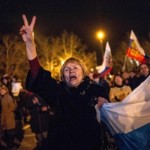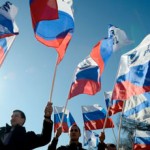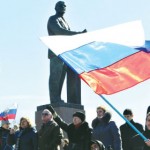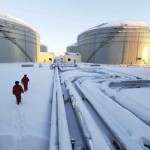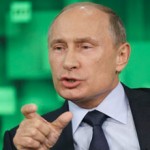Russia Sounds Alarm on Economy as West Starts With Sanctions
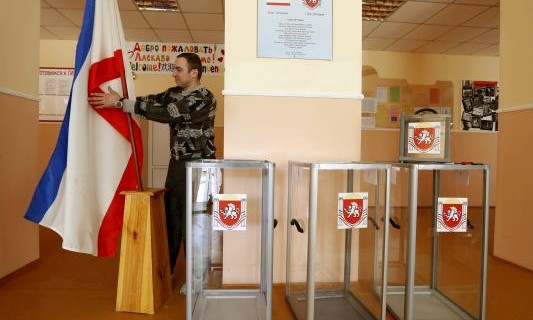
Russia’s economy is showing signs of a crisis, the government in Moscow said as the U.S. and the European Union announced sanctions over its support for the Crimea region breaking away from Ukraine.
“The situation in the economy bears clear signs of a crisis,” Deputy Economy Minister Sergei Belyakov said in Moscow yesterday. The cabinet needs to refrain from raising the fiscal burden on companies, which would be the “wrong approach,” he said. “Taking money from companies and asking them afterward to modernize production is illogical and strange.”
Even before the worst standoff against the West since the Cold War, Russia’s economy was facing the weakest growth since a 2009 recession as consumer demand failed to make up for sagging investment. President Vladimir Putin supported a request from Crimea to join Russia, signing an order to approve an accord on the breakaway region’s accession before a meeting today with lawmakers.
The Ukrainian crisis is putting a strain on Russia’s $2 trillion economy, which grew 1.3 percent in 2013 after expanding 3.4 percent the previous year. Last year’s growth was “insufficient” and the current outlook and government forecasts “can’t satisfy us,” Putin said March 12. The Economy Ministry projects growth will average 2.5 percent a year through 2030.
Ruble Drops
Russia will probably dip into a recession in the second and third quarters of this year as “domestic demand is set to halt on the uncertainty shock and tighter financial conditions,” Vladimir Kolychev and Daria Isakova, economists at Moscow-based VTB Capital, said in a research note yesterday. They cut their 2014 estimate to zero growth from 1.3 percent.
The ruble has weakened about 11 percent against the dollar this year, more than any of the 175 currencies tracked by Bloomberg except the Argentine peso, the Ukrainian hryvnia, the Kazakh tenge and Zambia’s kwacha.
EU foreign ministers yesterday agreed to freeze assets and impose visa travel bans on 21 Russian, Crimean and former Ukrainian officials, while U.S. President Barack Obama imposed sanctions on seven Russians.
“Further provocations will achieve nothing, except to further isolate Russia and diminish its place in the world,” Obama said yesterday at the White House. The U.S. can “calibrate our response” based on whether Russia chooses “to escalate or to de-escalate the situation.”
Crimea Pact
Russia should sign a treaty accepting Crimea’s accession as one of its regions, according to an order signed by Putin and published on a government website today. He is scheduled to address lawmakers and regional leaders today in Moscow on Crimea, which voted on March 16 to join Russia.
The direct cost of annexing Crimea will be at least $3 billion for the Russian budget, according to Vladimir Osakovskiy, chief economist for Russia and the Commonwealth of Independent States at Bank of America Corp. in Moscow.
That amount includes $2 billion to replace funds from Ukraine’s budget and raise wages and pensions to the Russian level, as well as $1.5 billion to $2 billion for infrastructure upgrades, Osakovskiy said in an e-mailed response to questions.
Russia already plans to spend at least 50 billion rubles ($1.4 billion) to build a bridge across the strait of Kerch, Transport Minister Maxim Sokolov told reporters March 5.
Rate Increase
The ruble’s slide, exacerbated by the intensifying tensions over Ukraine and the threat of sanctions, forced the central bank to look past sluggish growth and tighten monetary policy. Bank Rossii lifted its benchmark interest rate to 7 percent from 5.5 percent at an emergency meeting March 3.
Policy makers held borrowing costs at their regular meeting on March 14 and said the benchmark rate wouldn’t be cut in the next several months.
Consumer-price growth accelerated to 6.2 percent in February from a year earlier from 6.1 percent in January. Bank Rossii wants to keep inflation within 5 percent this year after missing its target range of 5 percent to 6 percent in 2013.
While Putin at a March 12 meeting with senior officials in Sochi called the economy “stable,” a range of economists cut forecasts for this year.
Near Recession
Morgan Stanley (MS) economists Jacob Nell and Alina Slyusarchuk lowered their estimate for 2014 growth to 0.8 percent from 2.5 percent, according to a note to clients yesterday.
“We see Russia close to recession in the first half of 2014 as a result of the Ukrainian security crisis driving higher rates and risk premia, leading to weaker consumptions and contracting investment,” they wrote.
Monetary tightening will make borrowing more expensive and difficult for businesses and consumers, possibly leading to recession this year, Vladimir Miklashevsky, an economist at Danske Bank A/S (DANSKE) in Helsinki, wrote in a note clients. Even a forecast of 1 percent growth this year is optimistic given the geopolitical environment, he said, cutting his estimate to that level from 2.6 percent on March 14.
Capital outflow from Russia may reach $70 billion in the first quarter and there is “a real risk that this could push Russia into recession,” London-based Capital Economics said in a report published yesterday.
Even before the protests in Kiev turned deadly last month, Russian Deputy Economy Minister Andrey Klepach said capital outflows were increasing and may reach $35 billion in the first quarter, more than half of the $63 billion for all of 2013.
One way of helping accelerate growth would be to ease the costs of companies, Belyakov said yesterday. The total tax burden in the economy slightly fell to 33.3 percent of gross domestic product last year, Deputy Finance Minister Sergei Shatalov said at the same conference.
“From the business point of view, the fiscal burden, I think, is extremely high today for both the economy and companies,” Belyakov said.
(By Olga Tanas and Anna Andrianova)
Source: bloomberg









